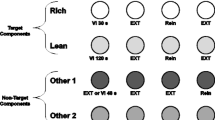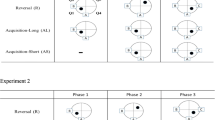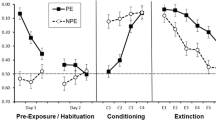Abstract
A modified before-after design was used to assess the influence of behavioral contingencies on the development of tolerance to ethanol, monitored with both a behavioral (moving belt, shock avoidance) task and a physiological (body temperature) response measure. Male Long-Evans rats received ethanol (2.0 g/kg IP) and daily moving belt training under one of four conditions: (1) daily injection of ethanol before moving belt sessions; (2) daily injection of ethanol after belt sessions, with intermitten intoxicated practice; (3) daily injection of ethanol after belt sessions, with no intoxicated practice; (4) daily injections of saline, with intermittent intoxicated practice. After a 28-day tolerance acquisition phase, all groups received a final moving belt test and temperature assessment after injection of ethanol. Development of tolerance to the motor effects of ethanol was seen only in animals receiving daily injections before behavioral training. By contrast, tolerance to the hypothermic effect of ethanol developed equally in all groups. The augmented development of tolerance to the motor effects of ethanol may not, therefore, indicate a generalized state of neuronal adaptation; rather, it appears to reflect a fairly specific response acquired by the organism.
Similar content being viewed by others
References
Campbell JC, Seiden LS (1973) Performance influence on the development of tolerance to amphetamine. Pharmacol Biochem Behav 1: 703–708
Chen CS (1968) A study of the alcohol-tolerance effect and an introduction of a new behavioral technique. Psychopharmacologia 12:433–440
Chen CS (1979) Acquisition of behavioral tolerance to ethanol as a function of reinforced practice in rats. Psychopharmacology 63: 285–288
Commissaris RL, Lyness WH, Cordon JJ, Moore KE, Rech RH (1980) Behavioral tolerance to the effects of LSD in the rat. Subst Alcohol Actions Misuse 1:203–207
Crowell CR, Hinson RE, Siegel S (1981) The role of conditional drug responses in tolerance to the hypothermic effects of ethanol. Psychopharmacology 73:51–54
Dunn OJ, Clark VA (1974) Applied statistics: Analysis of variance and regression. Wiley, New York
Gibbins RJ, Kalant H, LeBlanc AE (1968) A technique for accurate measurements of moderate degrees of alcohol intoxication in small animals. J Pharmacol Exp Ther 159:236–242
Goldstein A, Aronow L, Kalmon SM (1974) Principles of drug action: The basis of pharmacology, Wiley, New York
Kalant H, LeBlanc AE, Gibbins RJ (1971) Tolerance to, and dependence on some non-opiate psychotropic drugs. Pharmacol Rev 23:135–191
Le AD, Poulos CX, Cappell H (1979) Conditioned tolerance to the hypothermic effect of ethyl alcohol. Science 206:1109–1110
LeBlanc AE, Gibbins RJ, Kalant H (1973) Behavioral augmentation of tolerance to ethanol in the rat. Psychopharmacologia 30:117–122
LeBlanc AE, Gibbins RJ, Kalant H (1975) Generalization of behaviorally augmented tolerance to ethanol, and its relation to physical dependence. Psychopharmacologia 44:241–246
LeBlanc AE, Kalant H, Gibbins RJ (1976) Acquisition and loss of behaviorally augmented tolerance to ethanol in the rat. Psychopharmacology 48:153–158
Mansfield JG, Cunningham CL (1980) Conditioning and extinction of tolerance to the hypothermic effect of ethanol in rats. J Comp Physiol Psychol 94:962–969
Schuster CR (1978) Theoretical basis of behavioral tolerance: Implications of the phenomenon for problems of drug abuse. In: Krasnegor NA (ed) Behavioral tolerance: Research and treatment implications. US Government Printing Office, NIDA Research Monograph 18
Siegel S (1975) Evidence from rats that morphine tolerance is a learned response. J Comp Physiol Psychol 89:498–506
Siegel S (1978) Tolerance to the hyperthermic effect of morphine in the rat is a learned response. J Comp Physiol Psychol 92:1137–1149
Tang M, Falk JL (1978) Behavioral and pharmacological components of phenobarbital tolerance. Natl Inst Drug Abuse Res Monogr Ser 18:142–148
Wenger JR, Berlin V, Woods SC (1980) Learned tolerance to the behaviorally disruptive effects of ethanol. Behav Neural Biol 28: 418–430
Wenger JR, Tiffany TM, Bombardier C, Nicholls K, Woods SC (1981) Ethanol tolerance in the rat is learned. Science 213:575–577
Woolverton WL, Balster RL (1979) Tolerance to the behavioral effects of phencyclidine: The importance of behavioral and pharmacological variables. Psychopharmacology 64:19–24
Author information
Authors and Affiliations
Rights and permissions
About this article
Cite this article
Mansfield, J.G., Benedict, R.S. & Woods, S.C. Response specificity of behaviorally augmented tolerance to ethanol supports a learning interpretation. Psychopharmacology 79, 94–98 (1983). https://doi.org/10.1007/BF00427791
Received:
Accepted:
Issue Date:
DOI: https://doi.org/10.1007/BF00427791




